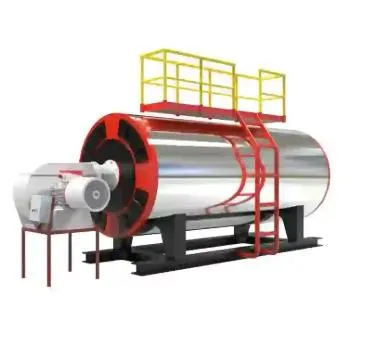
Jun . 09, 2025 10:57 Back to list
Thermal Oil Boiler for Sale: Sourcing Strategies and Quality Assurance
As a wholesaler specializing in industrial equipment, offering thermal oil boiler for sale requires meticulous supplier vetting. Prioritize manufacturers with ASME certifications (for U.S. markets) or CE marking (for EU exports)—a 2023 shipment to Canada was delayed due to missing CSA certifications, highlighting regulatory non-negotiability. When evaluating suppliers like Hebei Hongze Boiler, verify their production capacity (e.g., 100,000 sq.m. facilities ensure scale) and patent portfolio (over 30 patents signal technological innovation). For example, a wholesaler exporting to Australia must confirm the boiler’s compliance with the Australian Boilers and Pressure Vessels Standard (AS 1210), which mandates third-party inspections. Always request test reports for thermal efficiency (typically ≥95% for modern models) and emissions standards (NOx <300mg/m³ for EU markets).

Thermal Oil Boiler: Regulatory Compliance Across Markets
Navigating regulations for thermal oil boiler exports is crucial. Key regions have distinct requirements:
U.S. : EPA’s NSPS Subpart JJJJ regulates NOx emissions; boilers must also comply with state-specific codes (e.g., California’s Title 24).
Germany : VDI 2047 standards dictate noise levels (<85dB at 1m), while the German Boiler Ordinance (TRD) requires periodic inspections.
Japan : Boilers must meet the High Pressure Gas Safety Act, necessitating local agent registration before sale.
A case study from a U.K. wholesaler shows that misclassifying a boiler’s fuel type (e.g., gas vs. oil) led to a £20,000 fine—always cross-check the fuel specification with the client’s local infrastructure. For customers in France, emphasize boilers compatible with biomass fuels to align with the country’s renewable energy targets.
Hot Oil Boiler: Logistics and Installation Challenges
Shipping hot oil boiler systems requires specialized planning. These heavy-duty units (often 5–20 tons) need reinforced containers and lift plans. For exports to Australia, use seaworthy packaging with moisture barriers to prevent rust during ocean transport. When delivering to Canada’s northern regions, advise clients to insulate pipelines against sub-zero temperatures—unheated oil lines can cause viscosity issues, reducing system efficiency. Installation-wise, ensure the boiler meets local building codes: for example, New York City requires fire-rated enclosures for boilers over 100 HP. Partner with manufacturers who provide installation manuals in local languages (e.g., French for Quebec, Spanish for U.S. Hispanic markets) to ease customer onboarding.
Thermic Fluid Boiler: Technical Specifications and Market Trends
Understanding thermic fluid boiler technicalities differentiates successful wholesalers. Key specs to highlight:
Heat transfer capacity : Ranges from 500,000 to 50,000,000 kcal/h, suitable for small food factories in the U.K. or large chemical plants in the U.S.
Temperature control : Modern boilers offer ±1°C precision, critical for pharmaceutical processes in Germany.
Fluid compatibility : Ensure the boiler is rated for synthetic oils (e.g., Mobiltherm 600 series) or natural oils (like soybean-based) to cater to Australia’s eco-conscious clients.
A wholesaler targeting the U.S. market noted that boilers with integrated PLC controls saw 40% higher demand than manual systems, as manufacturers prioritize automation. For clients in France, promote boilers compatible with low-carbon fuels like hydrogen to align with EU Green Deal objectives.
Thermal Heating Oil: Fluid Selection and Maintenance Tips
Recommending the right thermal heating oil is vital for customer satisfaction. Advise clients based on their application:
High-temperature processes (300–350°C) : Synthetic oils like diphenyl oxide blends, ideal for plastics manufacturers in Canada.
Food-grade applications : NSF H1-certified oils, necessary for bakeries exporting to the U.S. or Australia.
Cold climates : Oils with low pour points (-40°C), critical for clients in northern Europe or Alaska.
Provide maintenance guides, such as annual oil analysis (viscosity, acid number, water content) to prevent system degradation. A U.K. case study showed that neglecting oil changes led to a boiler shutdown, costing the client £50,000 in repairs—position regular servicing as a value-added service to build trust.
FAQ: Essential Questions for Thermal Oil Boiler Wholesalers
How do I choose between a thermal oil boiler and a steam boiler for clients?
Thermal oil boilers excel in steady, high-temperature applications (e.g., asphalt production), while steam boilers suit fluctuating loads (e.g., food processing). Advise clients based on their process temperature needs and energy efficiency goals.
Can a thermal oil boiler be retrofitted for renewable fuels?
Yes, many models (like those from Hongze) can switch to biomass or natural gas with burner modifications. For the U.S. market, highlight boilers eligible for EPA’s Clean Energy Incentive Program.
What is the typical lifespan of a thermal oil boiler?
With proper maintenance, boilers can last 15–20 years. Emphasize manufacturers’ warranty terms (e.g., 5 years for pressure parts) and recommend annual inspections to extend life.
How do I handle oil leaks in thermal fluid systems?
Leaks often stem from aged gaskets or corrosion. Advise clients to schedule pressure tests (as per ASME Section VIII) and use high-temperature sealants. For exports to Australia, ensure replacement parts meet local standards.
Are there emissions restrictions for thermal oil boilers in the EU?
Yes, EU’s Industrial Emissions Directive (IED) limits NOx to 100–200mg/m³, depending on boiler size. Promote low-NOx burners or flue gas recirculation systems for compliance in markets like Germany or France.
By focusing on regulatory compliance, technical expertise, and after-sales support, wholesalers can thrive in the global thermal oil boiler market. Whether exporting to the U.S., Canada, Australia, or Europe, prioritizing quality certifications, logistics planning, and fluid management ensures long-term partnerships. As Hebei Hongze Boiler expands its international reach, emphasizing these considerations will solidify its reputation as a reliable supplier for wholesalers seeking to deliver high-performance, compliant solutions to clients worldwide.
-
Types of coal fired steam boiler: Efficient & Low Emissions
NewsNov.17,2025
-
Types of Coal Fired Steam Boiler | Efficient & Reliable
NewsNov.17,2025
-
Reliable Steam Boiler Supplier for Industrial Solutions
NewsNov.17,2025
-
Coal Fired Hot Water Boiler | High Efficiency & Durable
NewsNov.17,2025
-
Reliable Industrial Steam Boiler Manufacturers for Efficient Operations
NewsNov.17,2025
-
Commercial Steam Boilers for Sale - Efficient, Gas & Oil
NewsNov.17,2025
Related PRODUCTS






















